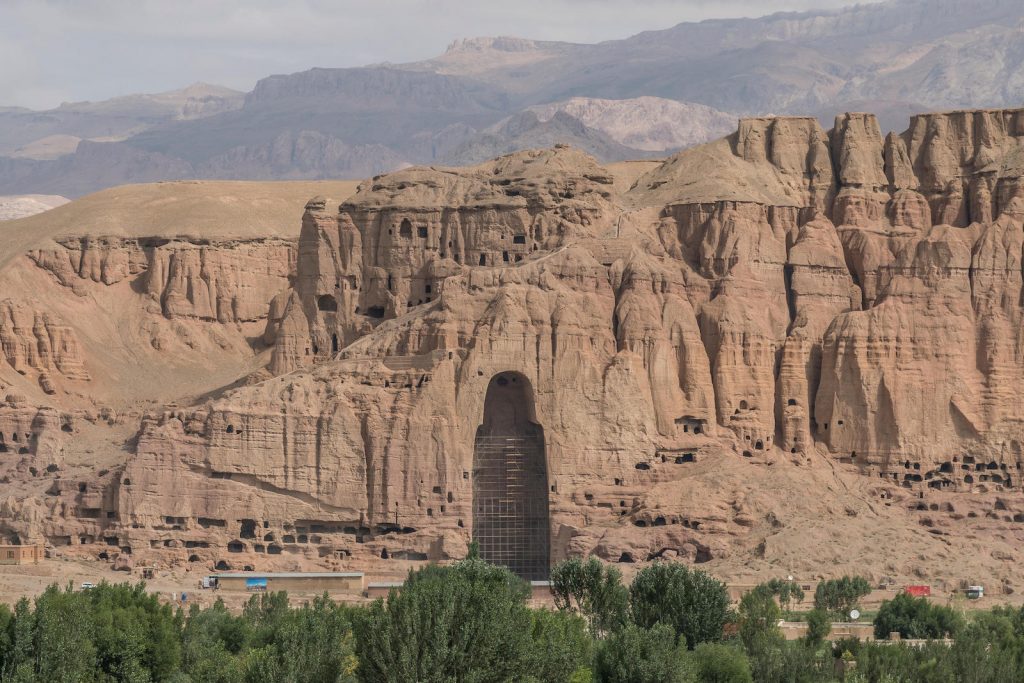Nothing is permanent, so everything is precious. Here’s a selection of some happenings—fleeting or otherwise—in the Buddhist world this week.
Taliban Takeover of Afghanistan Stokes Fear for Ancient Buddhist Artifacts
As the Taliban seized control of Afghanistan this week, chaotic scenes of protests and Afghans trying to flee the country filled the news amidst questions over the U.S.’s role, what could have been done differently, and what to do now. In a newsletter from Upaya Institute and Zen Center on Tuesday, Roshi Joan Halifax wrote, “Today, as we connect to the suffering of the people in Afghanistan, we are asked to examine our views and actions regarding the role of war and violence in our society and in our lives. We must stay awake to how our practice and views can influence the choices we make that can promote or end violence.”
The destruction of a statue of Shiite militia leader Abdul Ali Mazari, who was killed by the Taliban in 1996, recalled the two giant, 1,500-year-old Buddhas of Bamiyan that the Taliban blew up 20 years ago in the same province. As Buddhistdoor reports, museums and archeologists around the country were caught off guard by the speed at which the Taliban took over, and, in light of the Taliban’s history of cultural desecration, fear for the safety of ancient artifacts and sites, and the people who protect them.
China Marks 70th Anniversary of Invasion of Tibet with Call for Cultural Assimilation
On August 19, China marked the 70th anniversary of its invasion of Tibet with a celebration held in front of Potala Palace, the traditional home of the Dalai Lama. Reuters reports that Wang Yang, a high-ranking Chinese Communist Party (CPC) official who serves as a member of the party’s Politburo Standing Committee and as Chairman of the Chinese People’s Political Consultative Conference, delivered a speech for a hand-picked audience numbering almost 10,000. “Tibet can only develop and prosper under the party’s leadership and socialism,” said Wang, who, according to Bloomberg News, also advocated for larger efforts to ensure Chinese fluency and literacy among native Tibetans and further spread of the “cultural symbols and images of the Chinese nation.”
Two Buddhist Centers in Northern California Evacuated Due to Wildfires
This past week, two Buddhist centers in Northern California had to evacuate due to encroaching wildfires. The Chagdud Gonpa Rigdzin Ling retreat center was directly hit by the Monument Fire on Monday, prompting a quick evacuation and the arrival of fire crew reinforcements. The center released a statement the following day to share that the fire was still raging but four buildings remain intact. On Tuesday, residents at the Aloka Vihara Forest Monastery safely relocated to the Sacramento Dharma Center after receiving a mandatory evacuation order due to the growing Caldor Fire. There have been no reported injuries at either monastery. According to Thursday’s incident report, the Monument fire is currently ten percent contained while the Caldor Fire is zero percent contained.
American Buddhist Confederation Donates Ambulance to Brooklyn Hospital
The American Buddhist Confederation (ABC) donated a new ambulance to the Maimonides Medical Center in Brooklyn at a ceremony held on August 11. According to Buddhistdoor Global, the 2020 Mercedes Demers high-top sprinter van was part of a $120,000 donation, which includes funding for additional COVID-19 testing and vaccination programs for the Chinese community throughout the borough. “This generous donation will improve our response and medical transfer capabilities and help our efforts to directly address COVID-19 right here in Brooklyn,” said Maimonides President and CEO Kenneth Gibbs at the acceptance ceremony. The ambulance will transfer patients between the hospital’s main campus and its cancer center, transport medical materials, provide standby medical coverage, and also support events in the Chinese community. “We believe that only if we work together and help each other, we can overcome coronavirus and have the final victory in fighting [the] pandemic,” said American Buddhist Confederation President Ming Yu.
Thank you for subscribing to Tricycle! As a nonprofit, we depend on readers like you to keep Buddhist teachings and practices widely available.
